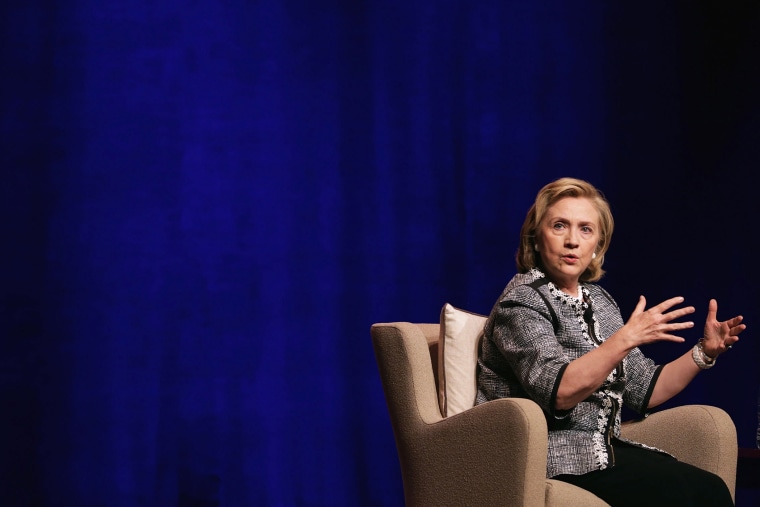Former Secretary of State Hillary Clinton's interview with Terry Gross on National Public Radio grew tense after the host repeatedly asked why Clinton had shifted on same-sex marriage after opposing it for most of her political career. Although Clinton had been a supporter of other anti-discrimination measures, she did not come out in support of same-sex marriage until after leaving President Obama's administration last year.
Clinton seemed to grow frustrated after Gross pressed the issue:
GROSS: You know, I'm just saying -- I'm sorry -- I just want to clarify what I was saying -- no, I was saying that you maybe really believed this all along, but -- you know, believed in gay marriage all along, but felt for political reasons America wasn't ready yet and you couldn't say it. That's what I was thinking.CLINTON: No. No, that is not true.GROSS: OK.CLINTON: I did not grow up even imagining gay marriage and I don't think you probably did either. This was an incredibly new and important idea that people on the front lines of the gay rights movement began to talk about and slowly but surely convinced others of the rightness of that position. And when I was ready to say what I said, I said it.
The question Clinton -- who leads the pack among early Democratic presidential contenders -- should answer today is whether she believes state same-sex marriage bans violate the Constitution.
Obama, who is by far the most pro-LGBT rights president to date, famously supported same-sex marriage as a state senator before opposing it in 2008 when he was running for president, and then announcing he had evolved to support it in 2012. Obama did exactly what Gross suggested Clinton did.
As Clinton herself stated, the country has moved rapidly on the issue, and many people who opposed same-sex marriage just a few years ago have now come to support it -- and not just politicians.
"Secretary Clinton is saying she is one of the millions of Americans -- the majority -- whose understanding and position evolved over time since we began making the case for the freedom to marry," Evan Wolfson, president of Freedom to Marry and one of the first advocates for same-sex marriage, told msnbc in an email. "Secretary Clinton's support for the freedom to marry -- like the case she made while at the State Department for the dignity, equality, and human rights of gay people worldwide -- is important as we continue to do the work still urgently needed to end marriage discrimination nationwide. That work is not yet done, since winning is not the same as won."
Still, despite her exchange with Gross, Clinton managed not to clearly state her position on same-sex marriage. Repeatedly throughout the interview, Clinton referred to marriage as a "state" issue, saying, "for me, marriage has always been a matter left to the states" and "I fully endorse the efforts by activists to work state-by-state."
What's happening state by state, though, is that LGBT rights activists are arguing that state bans on same-sex marriage are unconstitutional, especially because of the Supreme Court's reasoning in striking down the Defense of Marriage Act, which was signed by President Bill Clinton. Hillary Clinton offered a strange defense of that law in the interview, saying that "what DOMA did is at least allow the states to act. It wasn’t going to yet be recognized by the federal government but at the state level there was the opportunity."
It's not clear why Clinton feels the need to defend her husband's position on DOMA -- she was not president, and she didn't sign the law. But her defense is nonetheless misleading.
"The idea that the defense of marriage act was designed even in part to expand state autonomy over questions of marriage is absurd," said Adam Winkler, a law professor at UCLA. "For the first time federal law denied benefits of marriage to couples lawfully married under state law."
All of this raises the question of whether Clinton believes that state bans on same-sex marriage violate the Constitution's guarantee of equal protection under the law. The answer is not only important for same-sex couples -- it would also inform how Clinton, if she were elected president, would staff an administration and what kind of judges she might choose.
Nick Merrill, Clinton's spokesperson, pointed msnbc to Clinton's statement last year endorsing same-sex marriage as a "matter of law and policy." But after repeated requests, he would not give a direct yes or no answer to whether Clinton believes states have the authority to ban same-sex marriage. Clinton's statement announcing her support for same-sex marriage doesn't directly speak to the issue.
For what it's worth, Obama initially said that he believed states could ban same-sex marriage, but the legal reasoning adopted by the Justice Department and Attorney General Eric Holder encouraging state attorneys general not to defend those bans suggests Obama's federalism on same-sex marriage is entirely superficial. Coming out in favor of same-sex marriage personally, but supporting the authority of individual states to decide the matter, allowed Obama to couch his election-year endorsement of same-sex marriage in conservative language.
Since DOMA was struck down, more than a dozen judges have considered the question, and they've all come to the same conclusion -- that same-sex marriage bans violate the Constitution. The Supreme Court will almost certainly have to confront the issue. Since she's no longer in government, Clinton should at least be able to say where she stands before Justice Anthony Kennedy does. Unless Clinton is engaging in the type of political calculation that Gross suggested she was in opposing same-sex marriage in the first place.
